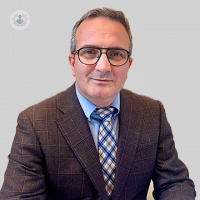Understanding hormone replacement therapy for transgender individuals
Written in association with:Hormone replacement therapy (HRT) is a critical element of the transition process for many transgender individuals. It involves the administration of hormones to align a person's physical characteristics with their gender identity.
Here, Dr Edson Nogueira, renowned consultant in endocrinology, diabetes, and general medicine, provides comprehensive information about HRT for transgender individuals, addressing common questions and concerns.

What is hormone replacement therapy for transgender individuals?
HRT for transgender individuals involves taking hormones to induce physical changes that align with one's gender identity. For transgender women (male-to-female or MTF), this typically means taking oestrogen and anti-androgens to develop more feminine characteristics. For transgender men (female-to-male or FTM), this entails taking testosterone to develop more masculine characteristics.
HRT is an essential part of the medical transition for many transgender individuals by helping to alleviate gender dysphoria, which is the distress caused by a discrepancy between a person's gender identity and the sex they were assigned at birth.
What initial assessments and tests are required before starting hormone replacement therapy for transgender individuals?
Before starting HRT, several assessments and tests are necessary to ensure the treatment is appropriate and safe. These typically include:
- Mental health evaluation: A mental health specialist assesses your understanding of HRT, your readiness for the changes it will bring, and any underlying mental health conditions.
- Medical history review: Your doctor reviews your medical history to identify any conditions that might affect HRT.
- Physical examination: A thorough physical examination helps establish a baseline for monitoring the effects of HRT.
- Blood tests: Blood tests are conducted to check hormone levels, liver function, and other vital health markers. This ensures your body can safely handle the hormonal changes of HRT.
These steps are crucial to creating a tailored HRT plan that addresses your specific health needs and transition goals.
What are the most common hormone regimens for transgender women (MTF) and transgender men (FTM)?
Hormone regimens for transgender women
For transgender women, HRT typically involves two main components: oestrogen and anti-androgens.
- Oestrogen: This hormone promotes the development of female secondary sexual characteristics, such as breast growth, softer skin, and redistribution of body fat. Oestrogen can be administered in several forms, including oral tablets, transdermal patches, and injections.
- Anti-androgens: These medications reduce the effects of testosterone, helping to suppress male secondary sexual characteristics like facial hair and a deep voice.
Hormone regimens for transgender men
For transgender men, HRT primarily involves testosterone.
- Testosterone: This hormone promotes the development of male secondary sexual characteristics, such as a deeper voice, increased body and facial hair, and increased muscle mass. Testosterone can be administered through injections, transdermal patches, gels, and implants.
The specific regimen and dosage will vary based on each patient’s individual needs and medical considerations, with regular monitoring to ensure optimal results and to minimise risks.
Can I still have gender affirmation surgery if I’m on hormone replacement therapy for transgender individuals?
Yes, you can still undergo gender affirmation surgery while on HRT. However, it's important to coordinate with your doctor and surgical team to ensure that your hormone levels are stable and that you are in good overall health before undergoing surgery.
How does hormone replacement therapy for transgender individuals help alleviate gender dysphoria?
HRT plays a significant role in alleviating gender dysphoria by aligning an individual's physical characteristics with their gender identity. This alignment can lead to several positive outcomes:
- Physical changes: HRT induces physical changes that are more congruent with an individual's gender identity, such as breast development in transgender women or increased body hair in transgender men. These changes can alleviate the distress caused by gender dysphoria.
- Psychological wellbeing: The physical changes brought about by HRT can improve self-esteem, confidence, and overall mental health, reducing symptoms of anxiety and depression often associated with gender dysphoria.
- Social acceptance: Achieving a physical appearance that matches one's gender identity can improve social interactions and acceptance, further reducing dysphoria and enhancing quality of life.
How often will I need to see my doctor once I start hormone replacement therapy for transgender individuals?
Regular follow-ups are crucial to ensure the safety and effectiveness of HRT.
After starting HRT, you may need to see your doctor every 3 to 6 months during the first year. These visits will involve monitoring hormone levels, assessing physical changes, and checking for any side effects.
Once your hormone levels have stabilised, you may need to see your doctor every 6 to 12 months. These visits will continue to monitor your health and hormone levels to ensure ongoing effectiveness and safety.
Always consult with a qualified specialist to tailor HRT to your specific needs and ensure a safe and effective transition.
If you would like to schedule an appointment with Dr Edson Nogueira, head on over to his Top Doctors profile today.


